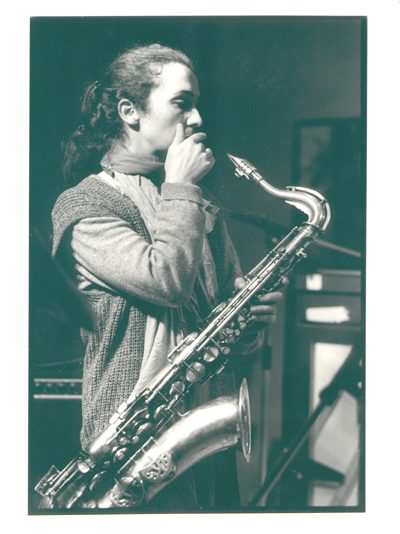
Presse Internationale -- U.S.A.-France

december 86 january 87
Anouncement of concert
A Rare Bird in JazzIand
 The
jazz life is one of late nights, midnight blues, burnt souls and, like the
music, unexpected change. The lonely saxophone player, fingering his pain
in a smokey bar, is a cliché portrayed in the movie « After
Midnight ». But clichés are made to be broken, and since
in the last decade women have been challenging a lot of standards, Nelly Pouget
should be no surprise.
The
jazz life is one of late nights, midnight blues, burnt souls and, like the
music, unexpected change. The lonely saxophone player, fingering his pain
in a smokey bar, is a cliché portrayed in the movie « After
Midnight ». But clichés are made to be broken, and since
in the last decade women have been challenging a lot of standards, Nelly Pouget
should be no surprise.
When she decided to play saxophone 17 years ago at the Conservatoire de Musique in Dijon, her « prof's eyes got very big ». Her professor, Jean Marie Londeix, was more shocked when she showed him a jazz rift she liked-he made her choose between that and him. Five years later, after finishing at the Conservatoire, she experimented with reggae, funk, and afro-jazz and found that jazz was still more satisfying. Asked why, she replied, « Jazz is music with the means for expressing what I have to say. In other music I can't say what I feel ».
Her music has taken her on an indirect route from Dijon to
Paris. Along the way she worked with children making musical instruments,
improvised with a dance troupe, accompanied an avant garde theatrical group,
and in 1981 came to Paris and played funk-reggae at La Scala. She's had the
opportunity to experi ment in tree jazz with Ray Ar thur Doyle, discussed
techni que with Steve Lacy, and jammed with Fela Kuti.
The saxophone became popular in the early 30s, replacing the clarinet in the jazz sound mainly because its tone is warmer, throatier, more similar to the human voice. Nelly uses it as a mouthpiece for her feelings. When she composes she addresses her self to a certain person, a friend, a poet or a painter. One composition can take from a week to two years to complete, 'till it feels right. And when she plays, she gives it all. « It takes so many hours and so much work-you give all that in one evening to your audience. It's very demanding. » And yet at the end of a concert, she always feels like she wants to make her work even stronger, give more.
The other side of creating music is survival, and jazz is a tough business. She tries to spend 5-6 hours a day practicing, but in addition to teaching music, she organizes concerts. Putting out publicity, finding, paying for and organising rehearsal space and time among 3 or 4 or more musicians, arranging for lighting, sound, tickets for the event, dealing with egos, competing for recognition - all this, plus the daily work of creating new music, earning money, and somehow finding time for an intimate relationship requires a lot of stamina.
In addition, last year she started a jazz club in Maine de Montreuil, « Le Grand 8. » It's an old « imprimerie » turned theater, and upon seeing it, Nelly suggested adding music to the program. She started by scheduling jazz groups. Then an enthusiast gave them money for a piano, they got together some mikes, built seating, and.now every Friday night it's jazz.
A woman playing saxophone is a rare bird in jazzland, but Nelly Pouget insists that she is a musician first. She refuses to let her gender either hinder or help her and will only say « To be a musician is not easy. You have to be very strong in jazz. »
Her music has been compared to that of John Coltrane's. She's also been told that she's ten years ahead of her time: Pressed to specify a label for her modern acoustic style, she suggests « optimistic jazz », « new traditional jazz », or perhaps « abstraction jazz », but when she plays, she's just playing what she feels. Her favorite compositions are called « Le Dire », « Sculpture », and an angel series, « Ange Promenade » and « Ange Barbare ». She paints her songs with mood, but says « I don't want to play sad songs because there are already so many sad people out there. »
The Nelly Pouget Quartet will be playing on Friday, January 23rd at 8pm at the American Church,
by Alison Benney